Related Research Articles

Jalal Talabani was an Iraqi politician who served as the sixth president of Iraq from 2005 to 2014,as well as the president of the Governing Council of Iraq. He was ethnically Kurdish.

Haider Jawad Kadhim al-Abadi is an Iraqi politician who was Prime Minister of Iraq from September 2014 until October 2018. Previously he served as Minister of Communication from 2003 to 2004,in the first government after Saddam Hussein was deposed.

The Peshmerga are the armed forces of Iraqi Kurdistan,an autonomous region in northern Iraq. According to the Constitution of Iraq,regional governments are responsible for "the establishment and organization of the internal security forces for the region such as police,security forces,and guards of the region". Other Kurdish defence and security agencies include the Zêrevanî(gendarmerie),Asayish,and the Parastin ûZanyarî. The Peshmerga's history dates back to the 18th century,when they began as a tribal paramilitary border guard under the Ottoman Turks and the Safavid Iranians. By the 19th century,they had evolved into a disciplined and well-trained guerrilla force.

Hawija is the central town of Al-Hawija District in the Kirkuk Province of Iraq,45 km (28 mi) west of Kirkuk,and north of Baghdad. The town has a population of about 480,000 inhabitants.

Nouri Kamil Muhammad-Hasan al-Maliki,also known as Jawad al-Maliki,is an Iraqi politician and leader of the Islamic Dawa Party since 2007. He served as the Prime Minister of Iraq from 2006 to 2014 and as Vice President from 2014 to 2015 and again from 2016 to 2018.
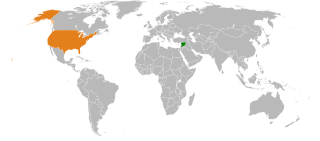
Although relations began in 1835,diplomatic relations between Syria and the United States are currently non-existent;they were suspended in 2012 after the onset of the Syrian Civil War. Priority issues between the two states include the Arab–Israeli conflict,the Golan Heights annexation,alleged state-sponsorship of terrorism,etc. As of 2025,the United States had begun to work with the new Syrian government after the collapse of the former regime under the Assad family.

Mohammed Shia' Al Sudani is an Iraqi politician who has been the Prime Minister of Iraq since 27 October 2022. Prior to his premiership,he held a number of ministerial positions;namely,Minister of Labour and Social Affairs,acting Minister of Industry and Minerals,acting Minister of Trade,acting Minister of Migration and the Displaced,acting Minister of Finance,acting Minister of Agriculture,and Minister of Human Rights. Furthermore,he has also held the position of Governor of Maysan,and Mayor of Amarah.

Brett H. McGurk is an American diplomat,attorney,and academic who served in senior national security positions under presidents George W. Bush,Barack Obama,and Donald Trump. He currently serves as deputy assistant to President Joe Biden and National Security Council coordinator for the Middle East and North Africa.
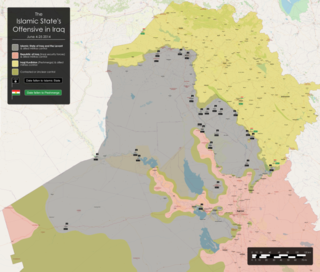
The Northern Iraq offensive began on 4 June 2014,when the Islamic State of Iraq and Levant,assisted by various insurgent groups in the region,began a major offensive from its territory in Syria into Iraq against Iraqi and Kurdish forces,following earlier clashes that had begun in December 2013 involving guerillas.

The General Military Council for Iraqi Revolutionaries,was a Ba'athist militant group in Iraq headed by Saddam Hussein-era military and political leaders. It was described by Al Jazeera as "one of the main groups" in the Iraqi insurgency.
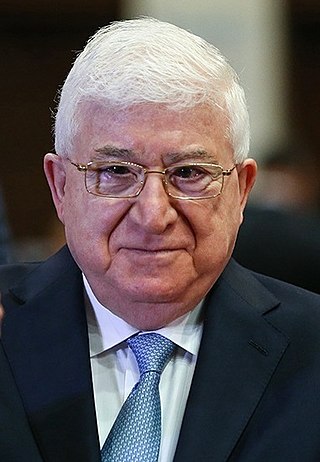
Muhammad Fuad Masum is an Iraqi Kurdish politician who served as the seventh president of Iraq from 24 July 2014 to 2 October 2018. He was elected as president following the 2014 parliamentary election. Masum is the second non-Arab president of Iraq,succeeding Jalal Talabani,also Kurdish,and was a confidant of Talabani.
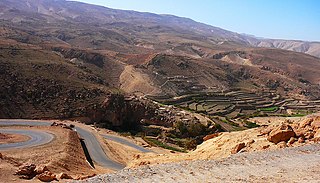
The Sinjar massacre marked the beginning of the genocide of Yazidis by ISIL,the killing and abduction of thousands of Yazidi men,women and children. It took place in August 2014 in Sinjar city and Sinjar District in Iraq's Nineveh Governorate and was perpetrated by the Islamic State of Iraq and the Levant (ISIL). The massacre began with ISIL attacking and capturing Sinjar and neighboring towns on 3 August,during its Northern Iraq offensive.
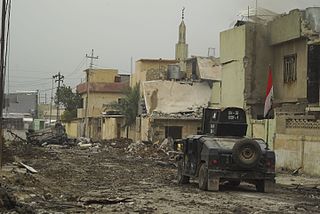
The War in Iraq (2013–2017) was an armed conflict between Iraq and its allies and the Islamic State. Following December 2013,the insurgency escalated into full-scale guerrilla warfare following clashes in the cities of Ramadi and Fallujah in parts of western Iraq,and culminated in the Islamic State offensive into Iraq in June 2014,which lead to the capture of the cities of Mosul,Tikrit and other cities in western and northern Iraq by the Islamic State. Between 4–9 June 2014,the city of Mosul was attacked and later fell;following this,Prime Minister Nouri al-Maliki called for a national state of emergency on 10 June. However,despite the security crisis,Iraq's parliament did not allow Maliki to declare a state of emergency;many legislators boycotted the session because they opposed expanding the prime minister's powers. Ali Ghaidan,a former military commander in Mosul,accused al-Maliki of being the one who issued the order to withdraw from the city of Mosul. At its height,ISIL held 56,000 square kilometers of Iraqi territory,containing 4.5 million citizens.

The departure of US troops from Iraq in 2011 ended the period of occupation that had begun with the U.S.-led invasion in March 2003. The time since U.S. withdrawal has been marked by a renewed Iraqi insurgency and by a spillover of the Syrian civil war into Iraq. By 2013,the insurgency escalated into a renewed war,the central government of Iraq being opposed by ISIL and various factions,primarily radical Sunni forces during the early phase of the conflict. The war ended in 2017 with an Iraqi government and allied victory,however ISIL continues a low-intensity insurgency in remote parts of the country.

On 22 September 2014,the United States officially intervened in the Syrian civil war with the stated aim of fighting the Islamic State (ISIL/ISIS) terrorist organization in support of the international war against it,code named Operation Inherent Resolve. The US currently continues to support the Syrian Free Army opposition faction and the Kurdish-led Syrian Democratic Forces opposed to both the Islamic State and former Syrian president Bashar al-Assad.
The following lists events that happened during 2014 in Iraq.
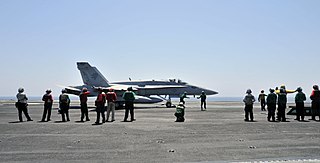
On 15 June 2014 U.S. President Barack Obama ordered United States forces to be dispatched in response to the Northern Iraq offensive of the Islamic State (IS),as part of Operation Inherent Resolve. At the invitation of the Iraqi government,American troops went to assess Iraqi forces and the threat posed by ISIL.

The Iranian intervention in Iraq has its roots in the post-2003 invasion of Iraq by the United States and its allies,when the infrastructure of the Iraqi armed forces,as well as intelligence,were disbanded in a process called "de-Ba'athification" which allowed militias with close ties to Tehran to join the newly reconstituted army.
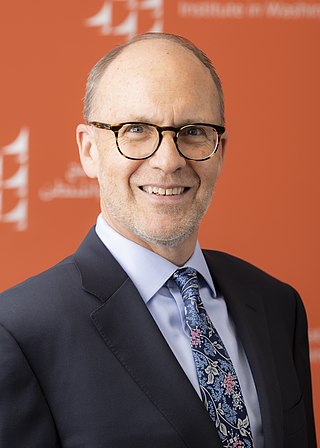
Douglas Alan Silliman is the president of the Arab Gulf States Institute in Washington and a former American diplomat who served as United States Ambassador to Kuwait (2014-16) and Iraq (2016-19).
References
- ↑ "Ambassador Lukman Faily's Biography" . Retrieved 21 August 2013.
- ↑ "July 2013". The Washington Diplomat. 26 June 2013. Retrieved 21 August 2013.
- ↑ Parasiliti, Andrew (25 July 2013). "Iraqi Ambassador Says Iraq Willing to Help Bridge US-Iran Divide". Al-Monitor. Retrieved 21 August 2013.
- 1 2 "Ambassador Lukman Faily's Biography". Embassy of the Republic of Iraq. Retrieved 21 August 2013.
- ↑ "Appointed-Ambassador Faily arrives in Washington". Embassy of the Republic of Iraq. Retrieved 21 August 2013.
- ↑ Jackson, David (18 July 2013). "Obama to welcome new ambassadors". USA Today. Retrieved 21 August 2013.
- ↑ "Statement by the President on Elections in Iraq". The White House. Retrieved 10 November 2014.
- ↑ "Iraqi ambassador: Diplomacy alone won't work". Morning Joe . Retrieved 10 November 2014.
- ↑ "Readout of the President's Call with Iraqi Prime Minister-designate Haider al-Abadi". The White House. Retrieved 10 November 2014.
- ↑ "Ambassador Faily Statement on Formation of New Iraqi Government". Embassy of the Republic of Iraq. Retrieved 10 November 2014.
- ↑ "Ambassador Faily: ISIS is a mutation of its predecessors". Embassy of the Republic of Iraq. Retrieved 10 November 2014.
- ↑ "Iraqi Ambassador: ISIS 'Is a Cancer Which Is Spreading'". Fox News . Retrieved 10 November 2014.
- ↑ "Ambassador's Biography". Embassy of the Republic of Iraq - Tokyo. Retrieved 21 August 2013.
- ↑ Butler, Charles (20 March 2014). "Iraq's Ambassador to US Prepares for Boston". Runner’s World. Retrieved 10 November 2014.
- ↑ Itkowitz, Colby (19 March 2014). "Iraqi ambassador to run Boston Marathon". Washington Post. Retrieved 10 November 2014.
- ↑ Springer, Shira (19 April 2014). "Iraqi ambassador runs Boston as a 'sign of solidarity'". Boston Globe. Retrieved 10 November 2014.